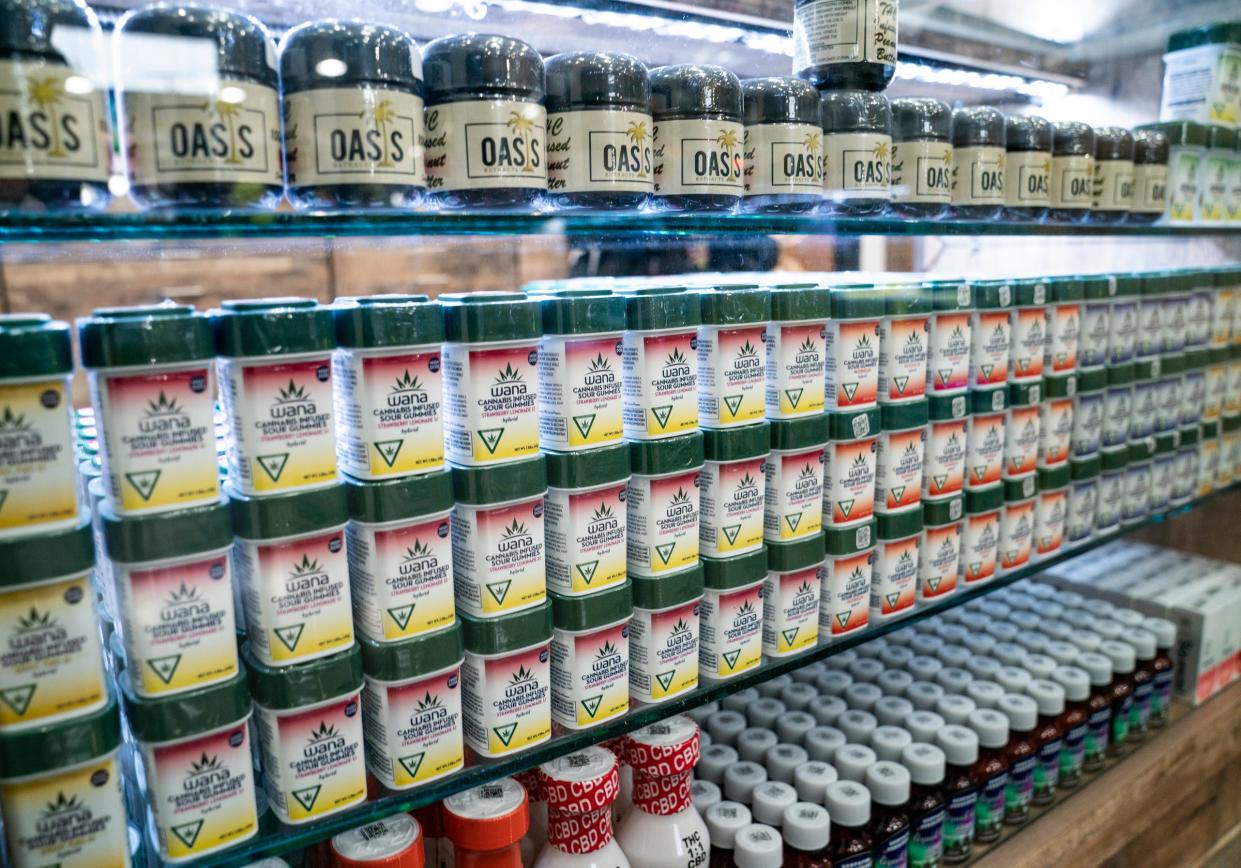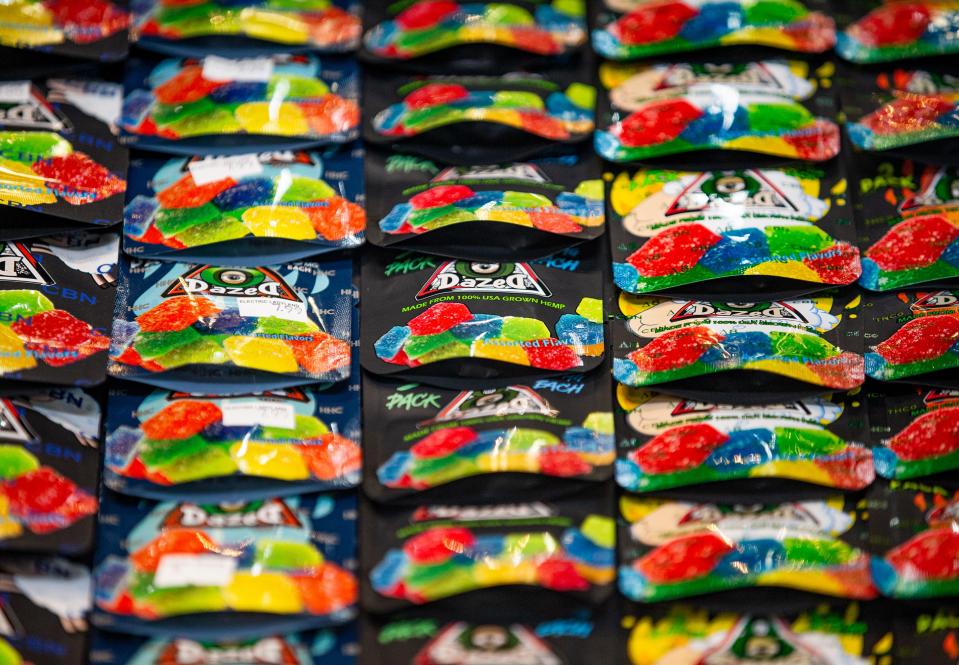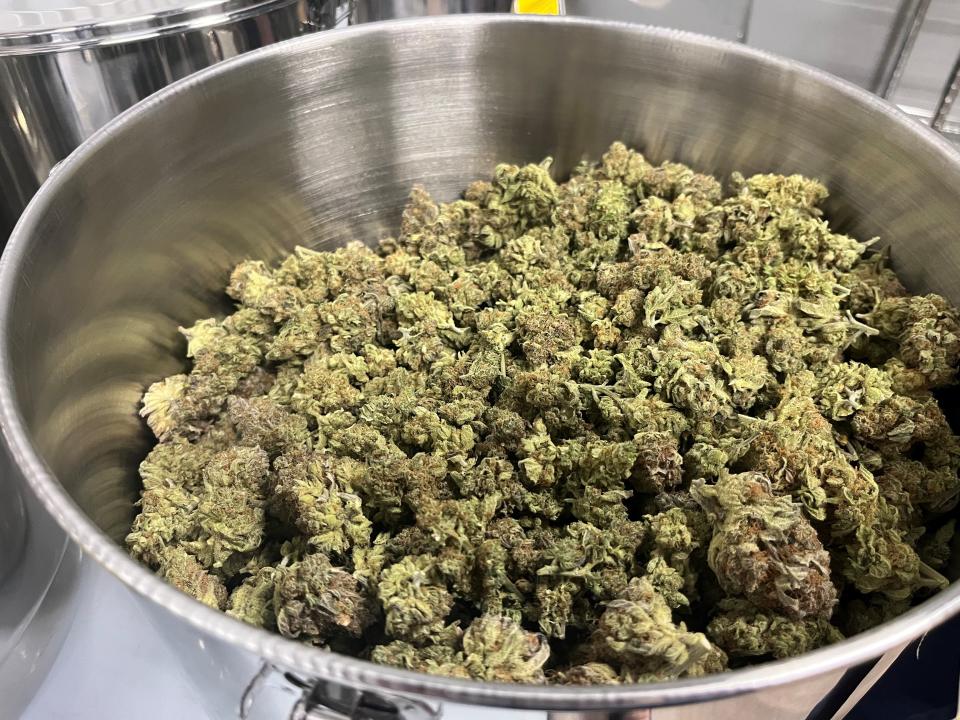Recreational marijuana is illegal in South Dakota, but its high-inducing cousins are widespread

Recreational marijuana is illegal in South Dakota – voters confirmed as much in November – but the next best thing is available from border to border.
The 2018 Farm Bill legalized the cultivation of hemp. By extension, it legalized two cannabinoids called delta-8 and delta-10 tetrahydrocannabinol (THC), which occur naturally in tiny amounts in the hemp plant.
When ingested in significant doses, each can create a high that’s all but indistinguishable from the one produced by traditional marijuana. Even when synthesized, the compounds are legal at the federal level because they occur naturally in a legal plant.
Retailers in South Dakota and around the country have now spent five years selling the chemicals in gummies, other edibles, oils in vape devices or in otherwise inert smokable hemp. The products can be loaded with large enough quantities of the THC variants to work as a stand-in for marijuana when consumed, either for recreational or medical purposes.
That reality has created a sort of drug policy dissonance in Pierre.
In contrast to fierce debates about the rules and regulations surrounding medical maijuana or allowable levels of delta-9 THC – the federally banned cannabinoid found in the marijuana plant – products spiked with its molecular cousins are legal to buy and consume for anyone older than 21 in South Dakota.
Between recreational and medical marijuana law changes in many states and the legality of the hemp-based products, “the battle for cannabis legalization is won,” said Rod Kight, a North Carolina lawyer who crafted the Hemp Industry Association’s position paper on D8 and D10 in 2021.
“Cannabis is legal in one form or the other everywhere in the country,” Kight said. “We have cannabis legalization. People just don’t recognize it as such.”
In Sioux Falls, shops with names like Roll N’ Smoke, High End Glass Gallery or Chasing Clouds sell D8 and D10 products alongside more traditional smoke shop fare like roll-your-own cigarette kits, nicotine vape pens or glass pipes. Gas stations and liquor stores, in Sioux Falls and around the state, also sell them.
In Pierre, there’s a delta-8 shop less than a block from the office where Attorney General Marty Jackley practiced law as a private attorney before taking office for his second term as the state’s top prosecutor.
The question states are now grappling with, Kight said, is how to regulate the emergent industry’s ubiquitous wares. More than a dozen states have taken a hard line and moved to ban the products, which Kight called a “last gasp effort” to maintain prohibition, and one Kight and others have successfully challenged in court.
Other states have moved to regulate the products with age restrictions and regulations for labeling and product testing. That’s where the industry hopes things land in all states, Kight said.
“We don’t want the ‘bathtub gin’ products out there. We want the ones that are produced in accordance with good manufacturing practices, where the labeling is accurate, consumers can go to a store, dispensary or online and rely on the products not harming them, in the same way they would if they’re buying vitamin C or canned spinach.”

South Dakota regulation
Lawmakers in South Dakota have spent the past few years trying to catch up, and have thus far taken the regulation route. In 2022, Rep. Taylor Rehfeldt, R-Sioux Falls, sponsored a successful effort to ban sales to those younger than 21.
This year, Rehfeldt is supporting House Bill 1226, which would require the South Dakota Department of Health to create rules for delta-8 and delta-10 testing, marketing and product labeling.
Instead of moving to ban the products five years after they became legal and available, Rehfeldt said, South Dakota ought to recognize that the genie is out of the bottle. An outright ban would be infeasible, she said, and unwise to undertake without the input of law enforcement or a study on the issue.
“The intention here is that we need to be good lawmakers and take a bite at the apple step by step,” Rehfeldt said Tuesday on the House floor.
The hemp industry in South Dakota supports HB 1226, an issue that came up in that same floor debate. Republican Rep. Kevin Jensen of Canton has strong feelings about what some have dubbed “diet weed,” and doesn’t trust the hemp industry to have South Dakotans’ best interests at heart.
Jensen, whose wife is a chemical dependency counselor, would like to see the products banned. He declined an opportunity to sponsor HB 1226 after he learned that the bill merely gave rulemaking authority to the Health Department.
“My idea is to get it the hell off the retail market,” Jensen told South Dakota Searchlight earlier this month.
This week on the floor, Jensen supported an amendment from Rep. Sue Peterson, R-Sioux Falls, that would have rewritten the bill to ban the products. He was among the backers of that failed amendment who said the hemp industry’s support is proof that Department of Health rules would help to legitimize the products and make them more difficult to ban in the future.
The Food and Drug Administration issued a warning on delta-8 last year pointing to the potential health risks of unregulated sale.
“I appreciate the industry bringing the bill but I don’t want to regulate harmful products,” said Rep. Fred Deutsch, R-Florence, who reminded the chamber that the Health Department opposes HB 1226. “I want to prohibit them.”
Attorney General Jackley has not taken a position on the bill, but issued a statement pertaining to any THC-related legislation.
“The attorney general is monitoring various marijuana bills,” spokesman Tony Mangan said. “The attorney general will certainly oppose any attempts to remove any protections for our youth or driving under the influence of these substances. The focus will be on safety.”

Is a ban enforceable?
Enforcing a ban on such a widely available substance could be a challenge. Banning the products would create an additional burden for law enforcement in the state.
South Dakota voters approved medical marijuana in 2020. The ability of citizens to offer evidence of a medical condition to defend against a marijuana possession charge, included in the voter-backed law, has already led to a dramatic decline in marijuana arrests in many areas of the state.
Add in the potential for legal delta-8 products that function like marijuana to appear in the pockets of those who come in contact with police, and the difficulty of enforcing recreational prohibition grows even more.
Tracking chemical variants can be difficult, according to Minnehaha County Sheriff Mike Milstead. Officers and deputies need to test products to determine their legality, he said, which can be an expensive task. The testing necessary to identify and write up case reports involving the chemical variants of far more hazardous drugs already eats up plenty of resources, the sheriff said.
“With drugs like fentanyl, trying to keep up with the analogs has been a constant battle,” Milstead said.
Delta-8 and delta-10 are only two of the cannabinoids making the rounds on the retail market. THC-O and Hexahydrocannabinol (HHC) are also gaining traction. There are 80 to 100 cannabinoids present in cannabis sativa, the plant species to which hemp and marijuana both belong.
A representative from a cannabis testing lab recently told STAT News that “there are new synthetic variants cropping up every week.”
Delta-8 in schools
Vape pens and other products with flavors like grape, chocolate cake or fruit punch are part of the reason the industry in South Dakota wants regulation, according to Katie Sieverding of the South Dakota Industrial Hemp Association.
Some of the marketing seems geared toward children, and that’s something she said “responsible retailers” want to deal with through regulation.
“There’s packages that are floating around that are labeled ‘Skittles,’ and they’re coming in from out of state,” Sieverding said. “Right now, there’s just no protection out there for consumers.”
Fruity flavored vape pens are a concern for school officials in South Dakota, whether they’re tied to addictive drugs like nicotine or to the oils found in THC products.
Officer Ryan Valland of the Sioux Falls Police Department spends his days at Jefferson High School. Valland has been a school resource officer for 17 years. In that time, he said, he’s watched the preferred substance delivery system make the switch from analog to digital.
He hasn’t confiscated a cigarette in a decade.
“The only difference between the kids doing it now and the kids doing it 17-20 years ago is the mode of ingesting it,” Valland said. “Before it was a stinky cigarette. Now it’s a fruity smelling vape. I wouldn’t say the population has actually increased, in my opinion.”
Valland confiscates one to two vape pens a week from students on average, he said, with around 90% containing nicotine. The other 10% contain some form of THC.
Those caught with a nicotine vape are cited. If there’s THC in a vape (Valland sometimes consults Google to find out if it might), he writes a case report and sends it to the state’s attorney.
“Our policy is if they’re in possession of a vape pen with THC in it, we charge it out as possession of marijuana,” Valland said. “As of right now, we don’t differentiate.”
Like Sieverding, Valland is concerned about the lack of regulation for vape products. Health experts testified to similar concerns in a learning session posted by the Sioux Falls School District this week, which focused largely on nicotine.
“We get so strict on the food that we eat and the labels on the box. But for the vape pens, we just don’t know,” Valland said.
Dell Rapids School District Superintendent Summer Schultz installed vape detectors in her school’s bathrooms to make it easier to catch those who might sneak a puff between classes.
Vaping has become so common for students, Schultz said, that “if I had to target one area, it would be my middle schoolers. It wouldn’t be my high schoolers.”
Kight, the hemp industry lawyer, argues that concerns about children using THC products are “mostly a red herring, but it does occur.” In the absence of legal age limits, Kight said, he advises his clients to have an age restriction for their shops.
No amount of regulation or consumer protection would be enough for opponents like Jensen, though. Jensen said he understands that a ban would put law enforcement in a difficult position, but he’d still rather prohibit hemp-related THC products than accept them.
“Right is right and wrong is wrong, pure and simple,” Jensen said. “If something’s wrong, I’m not just going to ignore it because we’re too busy.”
HB 1226, the bill that would require rules and product labeling for delta-8 and delta-10, passed the House of Representatives 48-22. It now heads to the Senate Health and Human Services Committee.
This article originally appeared on Sioux Falls Argus Leader: Recreational marijuana is illegal in South Dakota, but its high-inducing cousins are widespread

